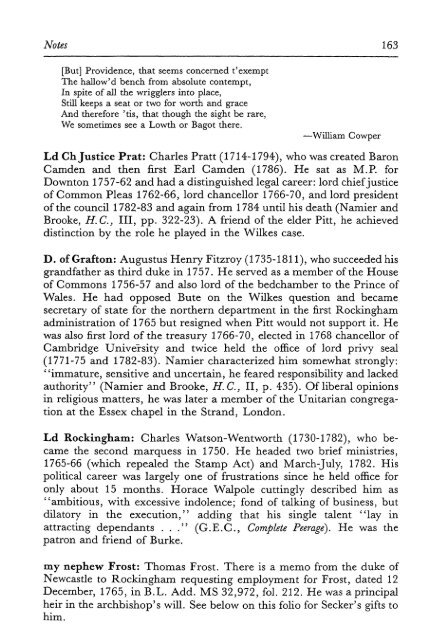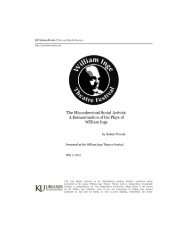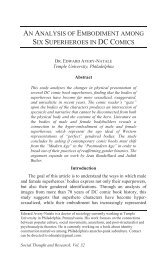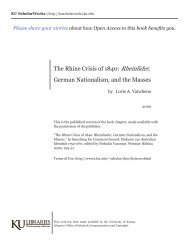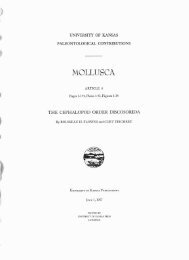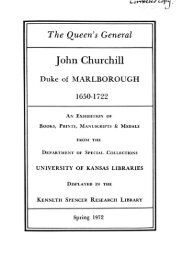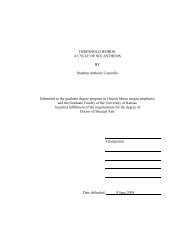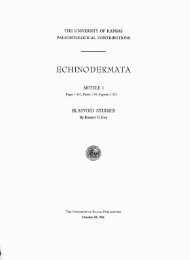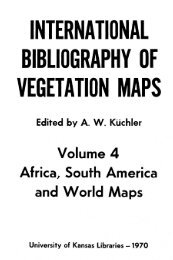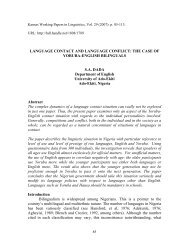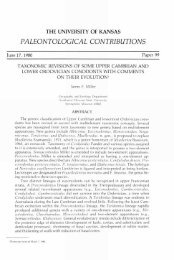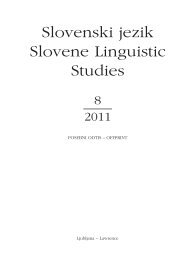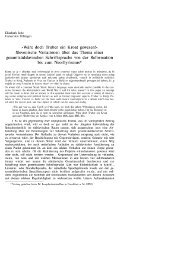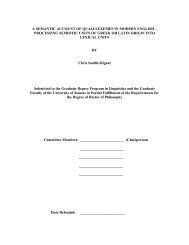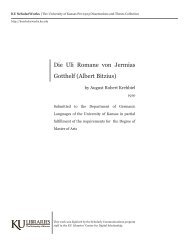Archbishop of Canterbury - KU ScholarWorks - The University of ...
Archbishop of Canterbury - KU ScholarWorks - The University of ...
Archbishop of Canterbury - KU ScholarWorks - The University of ...
You also want an ePaper? Increase the reach of your titles
YUMPU automatically turns print PDFs into web optimized ePapers that Google loves.
Notes 163<br />
[But] Providence, that seems concerned t'exempt<br />
<strong>The</strong> hallow'd bench from absolute contempt,<br />
In spite <strong>of</strong> all the wrigglers into place,<br />
Still keeps a seat or two for worth and grace<br />
And therefore 'tis, that though the sight be rare,<br />
We sometimes see a Lowth or Bagot there.<br />
—William Cowper<br />
Ld Ch Justice Prat: Charles Pratt (1714-1794), who was created Baron<br />
Camden and then first Earl Camden (1786). He sat as M.P. for<br />
Downton 1757-62 and had a distinguished legal career: lord chief justice<br />
<strong>of</strong> Common Pleas 1762-66, lord chancellor 1766-70, and lord president<br />
<strong>of</strong> the council 1782-83 and again from 1784 until his death (Namier and<br />
Brooke, H.C, III, pp. 322-23). A friend <strong>of</strong> the elder Pitt, he achieved<br />
distinction by the role he played in the Wilkes case.<br />
D, <strong>of</strong> Grafton: Augustus Henry Fitzroy (1735-1811), who succeeded his<br />
grandfather as third duke in 1757. He served as a member <strong>of</strong> the House<br />
<strong>of</strong> Commons 1756-57 and also lord <strong>of</strong> the bedchamber to the Prince <strong>of</strong><br />
Wales. He had opposed Bute on the Wilkes question and became<br />
secretary <strong>of</strong> state for the northern department in the first Rockingham<br />
administration <strong>of</strong> 1765 but resigned when Pitt would not support it. He<br />
was also first lord <strong>of</strong> the treasury 1766-70, elected in 1768 chancellor <strong>of</strong><br />
Cambridge <strong>University</strong> and twice held the <strong>of</strong>fice <strong>of</strong> lord privy seal<br />
(1771-75 and 1782-83). Namier characterized him somewhat strongly:<br />
"immature, sensitive and uncertain, he feared responsibility and lacked<br />
authority" (Namier and Brooke, H.C, II, p. 435). Of liberal opinions<br />
in religious matters, he was later a member <strong>of</strong> the Unitarian congregation<br />
at the Essex chapel in the Strand, London.<br />
Ld Rockingham: Charles Watson-Wentworth (1730-1782), who became<br />
the second marquess in 1750. He headed two brief ministries,<br />
1765-66 (which repealed the Stamp Act) and March-July, 1782. His<br />
political career was largely one <strong>of</strong> frustrations since he held <strong>of</strong>fice for<br />
only about 15 months. Horace Walpole cuttingly described him as<br />
"ambitious, with excessive indolence; fond <strong>of</strong> talking <strong>of</strong> business, but<br />
dilatory in the execution," adding that his single talent "lay in<br />
attracting dependants ..." (G.E.C., Complete Peerage). He was the<br />
patron and friend <strong>of</strong> Burke.<br />
my nephew Frost: Thomas Frost. <strong>The</strong>re is a memo from the duke <strong>of</strong><br />
Newcastle to Rockingham requesting employment for Frost, dated 12<br />
December, 1765, in B.L. Add. MS 32,972, fol. 212. He was a principal<br />
heir in the archbishop's will. See below on this folio for Seeker's gifts to<br />
him.


